
Satsvarupa dasa Goswami Maharaja
Spiritual Family CelebrationSaturday, July 5, 2025
What
Meeting of Disciples and friends of SDG
Where
The Veterans of Foreign Wars Hall
845 Hudson Avenue
Stuyvesant Falls, New York 12173There is plenty of parking near the Hall. The facility is just a few minutes’ walk from SDG’s home at 909 Albany Ave.
Schedule
10:00 – 10:30 A.M. Kirtana
10:30 – 11:15 A.M. Presentation by Satsvarupa Maharaja
11:15 – 12:30 P.M. Book Table
12:30 – 1:15 P.M. Arati and kirtana
1:15 — 2:15 P.M. Prasadam FeastContact
Baladeva Vidyabhusana at [email protected] or (518) 754-1108
Krsna dasi at [email protected] or (518) 822-7636SDG: “I request as many devotees as possible to attend so we can feel the family spirit strongly. I become very satisfied when we are all gathered together.”
******
Śrī Caitanya-caritāmṛta, Madhya-līlā 20.124–125: “O great learned devotee, although there are many faults in this material world, there is one good opportunity—the association with devotees. Such association brings about great happiness. . . . .”
Srila Prabhupāda: “Therefore, our Society is association. If we keep good association, then we don’t touch the darkness. What is the association? There is a song, sat-saṅga chāḍi’ kainu asate vilāsa, te-kāraṇe lāgila mora karma-bandha-phāṅsa (Gaurā Pahū, verse 3). Sat-saṅga. Sat-saṅga means association with the devotees. So the one poet, Vaiṣṇava poet, is regretting that, ‘I did not keep association with the devotees, and I wanted to enjoy life with the nondevotees. Therefore I’m being entangled in the fruitive activities.’ Karma bandha phāṅsa. Entanglement.” [Conversation with David Wynne, July 9, 1973, London]
If you would like to help, please contact Kṛṣṇa-bhajana dāsa at [email protected] or [email protected] and we will find you a service that utilizes your talents.
Srila Prabhupada exposes my mentality when he says some people object to Krsna’s order, “Surrender to Me.” They think, “Who is Krsna that I have to surrender to Him? I am as good as Krsna.” You feel selfish and tired and don’t want to serve Him. Better wake up, spirit soul. The stakes are high. If out of laziness and false ego you don’t want to serve Krsna, do you know what the alternatives are?
The way to serve is by prayerfully saying His Names. Don’t do it looking for your own bliss and thereby thinking, “The chanting is not working” when you don’t feel “something.” If all you want is to feel something, you can take a shot of whiskey. When you chant, be aware that you are serving Krsna, serving Rama, and that you want to do it. I truly want to serve with bhava, but because I cannot serve Him in that way right now, still I will serve with whatever I have.
******
This day has been given to you. It is given to the sparrows and worms and trees and flowers also. But the gift of a day in human life is a rare chance. Don’t think all you need to do is eat two meals and rest and fill up the other hours in a routine way. It may be possible today to make a serious improvement in japa. Even if it is a small step forward, you may be able to do it. Speak to your mind. Tell him the benefits of staying fixed on harer nama. And then stay fixed.
I have picked yellow and white wildflowers for the vase. The dogs didn’t bark. It’s cold but clear-skied. I tell you, it’s a great opportunity. To prove it, why don’t you chant a round now and really pay attention to the mantras from tongue to ear to mind to heart to soul?
******
Some slight improvement in late morning japa, which is usually a poor time. Involuntarily, I imagined that I was trapped inside a transparent covering. I wanted to be cut free from this. I called for help, and the maha-mantra was the means to cut me out from the covered trap. I also recalled writing to a Godbrother years ago and asking him his suggestions for poor japa. He replied that he found good results from chanting slokas before beginning the Hare Krsna mantra. I thought, “Yes, and also one can chant verses which specifically ask forgiveness for offenses to the holy name, as recommended in Srila Prabhupada’s purports.” And the willingness, despite repeated failures in the past—willingness to say these prayers rather than think it is useless—this is a sign of hope. To give up asking for forgiveness is like committing sins on the strength of chanting.
******
I found myself praying, “O God, O God, it is for You that I am praying when I say the mantras.” We may repeat these instructions again and again, but there is no way to turn them from theory into practice until a person does it for him or herself. No one can force you or do it for you. Even the most expert spiritual master cannot make it happen for you if you don’t take up his instructions. Even Lord Krsna who is coming to us in His most accessible form will not enter your heart, although He desires to do so, unless you call, “O God, please come. Please come into my heart and into my hearing of Your names.”
******
Sat on bed, kept awake one and a half hours by open window, very pleasant air outside. Long rounds, nine minutes, but I didn’t try to rush them or judge them just on that account.
I could see before me the two areas of mental choice—distraction or attentiveness. I decided to keep trying to hear. The involuntary distractions were more or less constant, but when I found myself in some protracted train of thought, I had sufficient mental awareness to regard my reverie as bizarre—after all, I am supposed to be chanting Hare Krsna, not reminiscing! So I went back to hearing. That moment of admittance and discovery of deliberate distraction is often a good time to switch to better attention than usual. And attention has come to mean thinking of Krsna, whose name I chant.
******
I want to be clear about my lack of remorse. It is a spiritual poverty not to feel lowly and fallen. I didn’t learn that on this retreat. But something happened here, I just don’t know what. At a certain point, I detected that my admission of poor chanting becomes unproductive. Am I whining or nagging myself? So I also try to see the good and cheer this fellow up.
Anyway, I am trying to achieve a permanent, surrendered position. I am not looking for psychological balance or blissful sensations. I am looking for simplicity and humility, sorrow that I am still waiting for Krsna to overpower me.
******
My Vedic sacrifices, chanting [of other mantras] and meditation are all useless and illusory. In my heart I know that without devotional service these things are a joke, like placing valuable ornaments on a naked body . . . although again and again I heard the sruti and smrti scriptures’ declaration that one should take shelter of Lord Hari’s lotus feet in order to become fearless, I did not chant Lord Krsna’s Name, and I did not meditate on His transcendental form.
I will now concentrate my mind on the lotus feet of Sri Sri Radha and Krsna, and all my material desires will flee far away. Narottama dasa says: now that I have fixed my mind on Sri Sri Radha and Krsna, I am no longer afraid of my future. (Sri Prarthana, Song 8, Texts 2, 4-5)
pp. 87-91
My dear Satsvarupa,
Please accept my blessings. I understand that Neal has left us and you have taken the responsibility for typing the records. Please let me know how many tapes are with you. I think you have five tapes with you because I have only got three with me. See that the tapes do not miss. You are a sincere devotee of the Lord, and certainly He will bless you with auspicious advancement in the matter of spiritual understanding.
I hope you are in full cooperation in the service of Krishna. I shall be glad to hear from you. Hope you are well.
Your ever well-wisher,
A.C. Bhaktivedanta Swami
As a complete beginner I was thrilled, and my life was changed by one statement in this letter: “You are a sincere devotee of the Lord, and certainly He will bless you with auspicious advancement in the matter of spiritual understanding.”
There may sometimes be a tendency for devotees, both new and old, to take Prabhupada’s instructions as commonplace. This is because devotees are accustomed to regularly hearing them in his letters, lectures, and purports. Similarly, although the holy name is the rarest thing, devotees may take chanting Hare Krsna for granted because they chant kirtana every day. One of the advantages, however, of being at the beginning stages of spiritual life is that the devotee is usually fresh and keen to hear from the spiritual master; the danger of contemptuous familiarity had not yet entered that relationship.
It is a common phenomenon that when one begins to learn anything, he makes advancement by leaps and bounds compared to what he knew before; further improvement takes time. If a man doesn’t know anything about playing golf, the first time he goes through a course he’ll make great advancement over his complete ignorance of the game. However, he still has to get his score down to par. That may be difficult for him, and his progress will not be as quick between each successive game as it was from complete ignorance to the first game. Since I was beginning my spiritual life, I did not regard this statement as ordinary or trite; it was very important for my spiritual development.
Prabhupada was not simply making a general statement. He was answering a question I wrote him in a letter. At the time we did not have Prabhupada’s translation of the Bhagavad-gita We had attended his Bhagavad-gita classes, where under his instruction we had been reading the verses translated by Dr. Radhakrishnan. Prabhupada had been there commenting on Radhakrishnan’s translations in his lectures, and we had been trying to understand the Bhagavad-gita from those lectures. I accepted Bhagavad-gita as transcendental knowledge. I could also perceive that the subject matter is subtle, and to understand it requires concentrated, subtle perceptive power (or intellectual power) but in a spiritual way. That is, by revelation or by the blessing of Krsna.
Prabhupada told us that unless one drank milk, the finer tissues of one’s brain would not develop to enable one to understand the transcendental topics. This implies that one has to live in goodness, like a brahmacari, to understand this valuable subject. People dulled by sense gratification who attend a Bhagavad-gita lecture will not even be able to understand the discussion. They have no idea what Brahman is, and they cannot understand the virtues of transcendental life.
I was yearning to understand the subtle, spiritual subject matter of the Bhagavad-gita. I was an infant in spiritual life. With the innocence and confusion of an infant, but with full trust in my spiritual father, I approached him by letter and asked whether I could understand transcendental knowledge. This question is similar to the first question I asked Srila Prabhupada when we were alone in his room: “Is there a level of spiritual advancement one can make from which he doesn’t fall back?”
I was pleased and enthused to think that I was a sincere devotee. At that time, January 1967, what had I done? I had not done anything to be considered sincere, except for executing a few typing tasks and giving money. To be called a sincere devotee was, to me, high praise, and coming from Srila Prabhupada I valued it deeply. Whatever Prabhupada wrote was read by all of us who were living in the storefront—not only the person Prabhupada directly praised or criticized in his letters—and all of it was regarded as most important. Although we were young students at that time, we did not think he was just speaking rhetoric. We had a great appreciation for Srila Prabhupada and knew that he was close to Krsna, that he was a grave personality, and that whatever he said was the absolute truth.
When I got this letter, I treasured it with all my heart—Prabhupada said I was a sincere devotee! I could also understand the instruction: because he said I was sincere, Krsna would therefore bless me with auspicious advancement. I knew that I could then understand the subtle subject matter of the Bhagavad-gita; what had to me seemed difficult to understand, I now felt I could realize in the future. The key to that understanding would be my sincere service as a devotee, which meant my service to Srila Prabhupada.
pp. 60-65
This is the new man after taking himself off
woodshedding all these hours
these years practicing
ready to burst out of his old mold.
The critics say he’s struggling
with his new concept,
the critics say, with their sharp eyes
and sharper tongues.
The critics say, “What are you doing?!”
Incredulous devotees say they don’t know but
each has to find their own way
discover a clear-bodied sound an
open life for Krsna
to awaken the heart
not crazy.
I have a better idea now that my little words
are those of a conditioned soul.
Rupa Gosvami speaks from direct
knowledge of how beautiful Radha is
how beautiful Krsna. I am simply
a parrot with a small contribution to make.
Because I cannot follow
the description of how the souls originate
in tatastha-sakti. What does it mean
to be eternal?
What were we doing before we decided
to come into this material world?
Who can help us understand?
The acarya sometimes uses branches
to point to the moon.
Who can understand the Atlantic Ocean
or a drop of it or a
seagull’s flight? Who can fly like
a gannet low over the waves?
Can you splash foam upwards on the
rocks like the inanimate sea?
Krsna knows, knows it all,
does it all.
I pray to understand bhakti, and
as far as all its technical categories
no one says I have to know
as long as I am in love
with Radha
and Krsna.
But I’m not–not yet.
So let me pray to Prabhupada
for that gift that
treasure
he wanted so badly to deliver.
As I write this, Kirtana-rasa is
standing at the edge of the meadow,
fingering his beads, chanting,
looking out at the ocean.
Madhu is somewhere in the house.
I’m getting this down before it’s too late
or I forget, before darkness settles around me
like a blanket.
I pray to You,
Lord of all,
please let me understand Your sweetness.
Let me serve those who love You best.
Please give me that understanding.
Walking in predawn on a lonely road and suddenly
I feel a light behind me. I think quickly
it’s the first glint of a car’s headlights and turn,
but there’s no car.
But I’m now facing east and
above that hill no yellow ball or even
hint of red but a more general lighting
has appeared, as if the stage director is
slowly turning up the lights.
It’s rare to catch Him in the act
rare to be caught in the exact drama of it,
but somehow this morning
I got lucky.
Can the holy name dawn in me like that,
sneaking up unawares, a feeling more than a
physical perception, a sudden willingness to
hear brought to bear on the soul,
a hope and a heart to live in the mantras
with no desire for any other kind of meditation
or yoga
or God?
Life is brief and poets have to write
even when they dream of picking up
cigar butts from the gutter while
black women and fat politicians stand by
and approve. Perhaps
it was a sign that I should pick up the trash
of my anarthas and throw them out
or perhaps it is just another
dream-riddle.
Thinking of Lord Caitanya walking in Puri—I
mean, going south
alone.
Miles in Vrndavana? Bhagavata dasa said,
“The dhama varieties unfold like Miles’ solos.” He means that new tunes
are always being revealed
and that the blues there are gutsy and
part of life
although life is sublime and above
Miles’ version of the blues.
We hear the Vrndavana blues in goodness.
I preserve and reserve
the right to say so. Yes,
it’s so.
O devotees, we sing the song of self of
our battleships and destroyers
their escorts gray
with white lettering
parked in our mental Navy yards.
Sad it was and sad it will be these
low hours when our delicate and corrupt selves
have boarded such ships, our desires intact, our hearts broken.
Rilke said it’s good for poets to enter the difficult.
Is it good for devotees too?
Music accompanied me aboard Navy ships, accompanies me now even in Vrndavana if only in spirit and metaphor, speaking of aloneness, secret hopes.
Wish I were walking in green meadows but
I’m not. I’m alone thinking of avant-garde
and traditions
and the difference between either and
telling the truth.
Life is simple. They bought me
a bottle of fancy unsweetened apple juice I
placed it on the windowsill and see birds
through it, birds with red-mottled heads
house finches, I’m told.
It’s abominable not to go for pure Krsna consciousness but to loiter in lower regions, exploring the modes.
My heart aches for Vrndavana. Why have I come here?
I look at a photo album my hosts have left out,
“Sadhus of Gita-nagari”—doesn’t show me anywhere although I lived here once.
The other day on my walk, I saw a sign, “No Trespassing”
on a little lot
some guy probably knows he’s in the Gita-nagari neighborhood
and doesn’t want any weird guys walking dazed
on his land, holding their beads and chanting to the skies or petting his cows.
pp. 64-66
To give this lecture I’ll have to actually meditate, feel the memory-presence of Srila Prabhupada. It’s all true that I’m telling. I’m very grateful it happened. I don’t mind telling it again. They haven’t heard it from me in maybe two or three years. So, go ahead and enter it. It can be a relaxed feeling like entering for a swim in a cool lake, for all of us.
Prabhupada. Remember to praise him even more than adore your own little self. You cherish that you were the object of his attention and that’s important in the retelling. But don’t miss the chance for philosophical tidbits about his nature, Gurudeva, krpa, Krishna, Sri Krishna Caitanya Mahaprabhu, etc. You have that pause while the translator puts it into Italian. You have all the time you need.
Hanging around in this hot room. We keep the shutters closed all day to keep the heat out but it’s still warm and dark unless the electrical light is kept on. Have been sleeping extra during the day. Leave tomorrow at 4:30 A.M. Looking forward to rainy Ireland.
When I explain to a friend that maybe I shouldn’t write a diary or that I doubt if a diary is best, he said why not consider lunar time, or orbit, or evolution, or archeological levels or dimensions other than daily? He said scientists and criminal investigators have to spend many days before they make a worthy discovery.
I replied that I work on the assumption that every hour in every day is worthy, needn’t be thrown away. Whatever I write is readable. I have to enter the moment. As I said this to him on the phone, I noticed better a wasp or two going in and out of the sunshiny open window place.
Be refreshed lad by a third shower
trippingly don’t trip be on guard for good music which –
I didn’t forget Krishna even when singing
to Gaura-Nitai this A.M.
In my cracked voice even a bop baritone
sax should be dovetailed
who can understand this but me? And my fans she
laughed
he played
a little jolly and tried his
best…Krishna Krishna was on
the run with His friends
in a gentle presentation of lila finale of the composer before the Sunday crowd –
the brahmacaris wanted some old mrdanga beats and got it soon enough
but Krishna knows some of us need more culture than that
Will the Lord deliver us if we remember His lilas only sometimes?
Pain inside,
in hide
this body
quarrel with mates
and peers
crying children.
What do you expect from me, it was a long time ago a fragment
is better than nothing
Prabhupada, Swamiji sacred words, I fall true at
your feet and your men and women, we don’t leave this place Prabhupadadesa
sweet songs, prasadam and try to make it not so stiff and
dogmatic in reply
thus, he went to the end of a great rumble party happy to die for the Lord? His own creative power was given to him
by God so he should tell of Him in that place
where it sparked, the brain
hey Krishna
O Master/we are sorry
competitors have come
we will live and end for
you
a true search for becoming a soldier
who didn’t quit
there is no point
in saying good-bye until
the very end
shower
bathe
talk of him…
You know you are without resources in this place, this room. Just tell the moments for as long as you live.
M. testing out the sound system: “My Lord, bring me closer to You.” – he hits the high note, strumming the bouzouki, macho and soft heart. Someone outside this room laughs in a different mood.
So hot, you’ll be glad…Ekayani writes me her father passed away and it taught her how important it is to treat everyone as persons right up until the end, regardless of whether they believe in an afterlife. Death is so poignant for everyone.
Up late, can’t sleep, won’t tell you it’s 9:40. Oh, argh – open mouth wide. Let’s get back to Ireland soon with no more daily obligations. Come out again every two weeks for Irish devotees and once a year for northeast U.S. – you know the schedule. It’s a good one.
I can do it with M. and if he gets left behind, then without him. And may they let me return to Ireland. Main thing is not Eire but Prabhupada and his service. I do write daily. Put it together into volumes and publish. Keep writing.
He asked me, “On what basis do you trust the process?”
Tell him the process is the Supersoul telling me what to write. It’s the method where you keep at it.
pp. 110-113
The first week I was relating purification of the body to throwing off of toxins in the mind. I defined toxins in the mind, then mentioned some of the things about ISKCON, and my attitudes toward its apparent shortcomings. Now that has stopped. A literary adviser might tell me to use recurring themes, but in life they don’t always recur, and I don’t think I should be artificial about that. I’m not looking for effect. My theme became what’s happening.
Throughout our visit, we have had to contend with the constant knocking on the door. What would they do in a Western hotel, ring the bell? Probably call you on the phone. Westerners would leave you alone more. In India, they don’t seem to be aware that it’s bothersome for a person to be called constantly. Or they don’t really care what you feel about it; they are paid to deliver you their services whether you want them or not. They don’t bang softly, either, or even briefly. There is a flurry of five knocks, and if you don’t respond immediately, they give another five knocks, only louder. It’s a joke, actually, but the joke is on us. We are paying for this disturbance. It’s part of the privilege of being a rich American to have people knock on your door throughout the day.
Therefore, sages live in caves and chant Hare Krsna where no one bothers them. Nowadays, devotees live in devotee communities where people don’t knock on your door. I look forward to going to a temple again. Soon we will be in Mayapur, then Vrndavana.
Hare Krsna Hare Krsna, Krsna Krsna Hare Hare. He went out on the road in a purple Studebaker—an old model, preserved. Young people look at him as an old man. Some wonder if his teeth and hair are real. They all see how thin he is. A thug would think he could beat him up; a girl would know she’ll get no action from this guy; he doesn’t even look at her. He gets out and walks the avenue of life in the last hours of his “Brahma’s day.” It’s already later afternoon for this guy. Winter is coming. Can he still gather harvest?
As we walk back and forth, the corpulent magnate comes out of his cottage. M. breaks the ice and says, “Good morning.” The man returns his greeting with a civil wave of his hand and a friendly look, that’s all. I remain silent in my Barcelona spectacles. We all walk briskly. We can hear the ocean surf, but we have no easy way to get to the sea.
I’d like to see
the ocean from the south
while the red sun-ball rises.
The lizard climbs the wall
in sunlight,
a TV flute is playing,
the attendant has made his
belated rounds delivering
morning lemon drinks.
Soon we’ll gather in
the gym-prayer hall
and I’ll recall the names
of my parampara.
All glories to Lord Caitanya
who is lifting my tired spirits.
Let me not forget
what I was and
let me always feel grateful
for my present.
“Maintain posture for a few more moments …” (Strain.)
“Relax. Breathe normally.”
Off I go, I don’t know where, but among rocky crags and clouds and strange associations—all the stranger because they’re not remembered. Srila Prabhupada said that sleep gives us a hint of the eternal self and what happens at death. He “dies” (sleeps), then wakes and takes up where he left off. In sleep, however, we return to this identity.
I’m on the floor of the gym with the thin, mustached doctor standing over us. At death we will fall into forgetfulness, and when we awake (are reborn) we will not find a conscious continuum from the past identity. The only continuum will be the continuance of suffering and illusion. Or, of course, for a devotee, the continuation of Krsna consciousness. We will automatically be attracted to the path again, and continue to cultivate it life after life until we attain cent percent success.
So at least don’t fall back. Try to maintain, but better to increase. Srila Prabhupada said we were Indians in a past life, followers of Lord Caitanya, and were born in the West to enlist in the Krsna consciousness movement. But what about next life? Back to India again to bathe every day in a pukkar, our brown bodies wrapped in gamchas? Oh, I hope I’m born a man again, and not a dog or a tree.
Sweet coconut water. This place isn’t so expertly organized —nothing happens on time. But coconut water sure is tasty. I am tasting it naturally now—no condiments.
You know the story
your knuckles are bared
some boy may sock you.
You want to be at
peace, serving and chanting,
but you may get drafted into
the Army, Or, if
you’re an Indian
boy going to a white school
and ask your mata for
white-bread sandwiches (no
capatis), and you fall for
illusions of love, the
bite of sex,
shame …
Born blind and ignorant until
the guru arrives. I wish I didn’t
have to go through
those travails anymore.
pp. 207-10
The more we appreciate Prabhupāda, the more we should study the finer points of serving him. Full-time practicing devotees in Kṛṣṇa consciousness often have to come to grips with problems of application or realization that involve details. The practitioner already agrees and accepts much that the nondevotee still has to be taught, such as that Lord Kṛṣṇa is the Supreme Personality of Godhead and that we should surrender to Him. But in the carrying out of the principles, we encounter detailed and practical considerations which become a concern and should be addressed and understood. Similarly, we all appreciate Prabhupāda, but as we attempt to do so thoroughly, we encounter fine points of appreciation as well as weeds. A weed which may appear in the garden of our devotion to Prabhupāda is a misuse of his authority.
There are different ways to misuse Śrīla Prabhupāda’s authority, such as misquoting him, using statements as evidence that have rather weak authenticity (as opposed to statements frequently included in books and tapes), using Prabhupāda’s statements in “preaching” to other devotees for some personal motivation, and imitation of Prabhupāda’s authority.
Misquoting Śrīla Prabhupāda is often committed innocently, but it is perhaps the most difficult mistake to eradicate from our movement. Devotees sometimes refer to something that was credited to Prabhupāda which he never actually said. Often, new devotees accept anyone’s claim that “Prabhupāda said,” and as in any tradition, inaccurate stories are passed down.
One way to avoid this is to repeat only those stories that you have read, either in Śrīla Prabhupāda’s books or in a bona fide literature about Prabhupāda. If you are unsure of the source of a quote you hear, you may ask the person speaking. If he has no reliable source, it is probably best not to repeat that story.
Śrīla Prabhupāda was quite aware that he was being misquoted by his disciples. He was regularly having to clear up the doubts springing from the rumors that there would be police repression and the saṅkīrtana would stop (Letter, 74-5-18); that his Guru Mahārāja was one of the eight śakhīs (Letter, 69-1-27); that there would be a depression and atomic war (Letter, 74-11-79); or that there should be no more marriages in ISKCON (Letter, 75-9-8)—all based on someone saying “Prabhupāda said.”
Once, while lecturing in the Bowery, one of his new students (Mr. Paul) had said, “Swamijī, I understand in your household life that you had twenty children.” Prabhupāda said he did not know where the man had gotten that information and he certainly did not have twenty children. Prabhupāda gave this as an example that you have to hear from the person himself rather than someone else.
Similar to the mistake of misquoting Prabhupāda is to take something he may have said in the light of a particular circumstance, even though it may not be his regular teaching on that point, and stress it as evidence. To claim that “Prabhupāda said” when in actuality he said many more things to the contrary is misuse of his authority.
The mahā-vakya (or absolute instructions) of Śrīla Prabhupāda’s teachings is present in his books. When Prabhupāda made other statements, we should try to see how these points are presented in his books. We should try to determine which statements are mahā-vakya, and which ones were presented according to a particular time and circumstance.
This does not minimize the value of these other statements by Prabhupāda, but by making a distinction between the two, we will be sure to be presenting Prabhupāda’s main teachings. There are a variety of statements which have rather weak authenticity. For example, we often hear devotees quote Prabhupāda, saying that he had completed only fifty percent of his work, to defend development of varnāśrama. But what is the origin of this statement? In Prabhupāda-līlāmṛta we find it as follows:
“We have all met together, Śrīla Prabhupāda. We want you to remain and lead this movement and finish the Śrīmad-Bhāgavatam. We said that you must remain for at least another ten years. You have only done fifty percent of your work.”
Śrīla Prabhupāda was listening carefully without any movement, but when Brahmānanda said “fifty percent,” he frowned and said, “No.” (Śrīla Prabhupāda-līlāmṛta)
Although Prabhupāda is purported to have used this figure of fifty percent again in London in 1977, it was originally spoken by Brahmānanda and not approved by Prabhupāda.
This does not mean that Prabhupāda did not consider the development of varnāśrama-dharma in ISKCON as very important. But using this particular reference as a mahā-vakya statement may not be the most authentic way to make one’s case. It would be better to find the many references in his books and lectures and use those as proof the varnāśrama should be developed.
pp. 64-69
Let us go more stately now. Consider direct praises of Lord Krsna, the Supreme Personality of Godhead. The Lord is not a metaphor, yet the Vaisnava poets use metaphors to convey the beauty of Sri Krsna, comparing His eyes to lotus petals and so on. Unless one is expert in metaphor (and it used to mean Sanskrit was required), one could not describe the Lord’s pastimes. For example, the KRSNA book portrays the full moon night in the sarat season, when Krsna desired to perform the rasa dance with the gopis: “With the rising of the moon, the whole sky appeared smeared by red kunkuma. When a husband long separated from his wife returns home, he decorates the face of his wife with red kunkuma. This long-expected moonrise of the sarat season was thus smearing the eastern sky.”
The metaphor is to help us see the absolute world of which we have no experience. The metaphor draws from experience of this world and is always inadequate to fully describe Krsna’s pastimes and personal beauty. His eyes are much more beautiful than the petals of a lotus in this world, but we have no standard by which to view Krsna, so the worldly natural beauty gives us at least a point of reference. Prabhupada compares it to locating the moon in the sky by finding it between the branches of a tree.
Sometimes the poets say frankly that Krsna’s beauty defeats whatever worldly example they might give. The Lord’s beauty scorns the moon, it spits at the beauty of gold, it embarrasses the grandeur of a mountain top, it comes to peace talks with coral and emeralds, and it mocks the taste of heavenly nectar.
“O Lord whose face eclipses the sweetness of the moon . . . O Lord who sings like a maddened cuckoo, 0 Supreme Personality of Godhead, I pray that the restless bumblebee of my heart may someday meet You face to face.” (Śrī Aśtadaṣa-cchandaḥ-stava, by Rupa Gosvāmī).
In describing Krsna, we don’t seek for one grand metaphor. Krsna is Himself the Absolute Reality; there is no truth higher than Him. An allegory is used to allude to a higher truth. An author creates a fictive character who embodies some higher moral principles. His character is a symbol for something else. The principles the author wishes to convey—his message—are real, and not the specific character or story. This is not true of Sri Krsna. Mattah parataram nanyat: “All the worlds are strung upon Me like pearls strung on a thread.” Yes, even Krsna uses analogy. Krsna is the thread and “everything” is strung upon Him. But the analogy is just a form of picture-making to enable use to see more clearly the absolute supremacy and personal truth of the Supreme Lord.
Nityo nityanam cetanas cetananam: He is eternal and we are also eternal, but He alone maintains all beings.
I pray to approach, with full faith, Krsna’s personhood, through His pure devotees. Devotional service is the medium for pleasing Krsna. We are all His eternal servants. That too is a reality and not a metaphor.
So metaphors serve as ways to express Krsna’s transcendental qualities. They are offerings made by sincere souls dedicated to serving and praising Him. We also describe devotees by using metaphors. Their minds are clear like the sky in autumn when there are only white clouds. Their minds are like candlelight in a windless place. Their mercy is compared to an ocean, krpa-sindhu. They are like kalpa-vrksa trees, awarding whatever we desire. They are as soft as roses, but sometimes as hard as thunderbolts.
Do I dare speak in my own voice about Lord Sri Krsna? I’m not so competent. That is one reason I seem to write more of myself than of God. I am a fool and there is no harm in splashing ink as I tell of my patched career. But I cannot draw a funny looking cartoon of the Supreme Personality of Godhead. He is not a joke or plaything, at least not for me. (The gopis sometimes treat Him that way, but they are completely and eternally pure. They have already passed through the fire of ordeal in order to become His paramour lovers.)
Dear Lord,
Laksmi-devi sits on Your chest,
the tulasi leaves are pleased
to sit upon Your lotus feet,
and devotees like Prahlada offer You
prayers and words of pure
devotion. What can I add?
Dear Lord, please accept me.
I know You wish all good
for me. I want to take up
my place in Your eternal service.
Srila Prabhupada wrote,
“If the Lord grants liberation even
to an enemy like Sisupala,
then surely the preachers
of the Krsna consciousness movement
who spread His glories,
who endure insults and
even death on behalf of the Lord,
are guaranteed to return to Him.
Of this there is no doubt.”
Dear Lord, I am chanting Your holy
names. I cannot get so far.
Please descend and penetrate the
covering. Please dwell in my heart.
Give me the courage and strength to
chant the holy names in earnest,
crying for the real thing—
service to nama.
Please teach my intelligence to
serve my spiritual master
with unstinting devotion
to his order.
Dear Lord, when You appeared
as Lord Caitanya,
You converted Sarvabhauma Bhattacarya
(and millions of lesser scholars)
and You happily declared,
“My mission in Jagannatha Puri is
now fulfilled!
I have converted a person like
Sarvabhauma Bhattacarya. I shall now be
able to attain Vaikuntha without fail.”
I liked to hear Your exultation
as a preacher and Your expectation
to go back to Godhead after
converting one logician into a
pure devotee.
I’d like to go too, and escape
the horrors of a Kali age.
But You may want me to stay
more lifetimes. You may be
arranging special mercy for me:
crushing my material desires
so that I may turn to You only.
Inconceivable One Lord,
no one can know all of Your glories.
But You are always a person and
all energies and demigods are
subordinate to You.
I feel relief and purification
in speaking of You.
Although I can’t claim to know You,
I may speak what I have heard.
And it is right.
Parampara.
All glories to the Lord
of the universe!
pp. 35-40
![]()
today we spoke of regular service to You and taking time off from work to contemplate You. I wish to do both. My prayer to You is the proper place for contemplation. I think of Your greatness and Your sweetness. There’s a black gospel song that goes something like this: “My Lord is so high you can’t get over Him/ So wide you can’t get around Him/ So low you can’t get under Him/ Such is the greatness of the Lord.” I really can’t contemplate You because You’re beyond the scope of estimation. Just the little things You do on this planet, like great the deep oceans and the heavy mountains, are beyond my comprehension. And what to speak of Your work in all the universes, all the agents You’ve assigned to manage affairs. As for Your sweetness, it takes one who is a lover to taste some of Your sweetness. Srimati Radharani and the gopis know of Your sweetness. But I lack the qualifications. Still, I acknowledge that You are incomprehensibly great and sweet. I believe in You, the all-powerful, the all-attractive. There is no one equal to You. I can contemplate You in ways like that, getting glimpses of You and acknowledging that You are the greatest.
In my own life, no one but You has ever appeared to offer me ultimate safety and liberation. No one but You has ever appeared to offer me unbounded love and forgiveness of offenses and sins. No one but You has ever appeared to offer me a life of eternity, knowledge and bliss. No one has had the power to assure me that I will not die and that I am an eternal spirit soul. This knowledge alone makes You the greatest teacher in my life and the most trusted guru. You are the greatest authority I have ever met. And You have kindly sent me Your representative, my spiritual master, Srila Prabhupada, to guide me to Your lotus feet. I can truly say that You are my ultimate savior and anyone else who helps bring me to You is a helper and does me good. I know these things about Your ultimate place by reading it in authorized Vedic literatures, by hearing from my own spiritual master, and from the spiritual masters in disciplic succession. Through them and the practices they have given, it has awakened in my own heart and my own experience. You are not just a great historical figure but the supreme Godhead, who exists at all time and in all places. I pray to You that when it is time to contemplate You, You will bring me closer, increase my love and knowledge of You, and let me know assuredly that You are my best friend. O Supreme Personality of Godhead, Lord Krsna, and Srimati Radharani, Your eternal Consort, I pray to You both today to grant me constant contemplation of Your glories.
You’ve got me laughing, You’ve got me crying, You’ve got me praying on my knees. You’re invisible, and beautifully present with Your peacock feather. You walk and You do not walk. You are far away but very near as well. You are within everything, and yet outside of everything. This is an explanation of Your transcendental activities as executed by Your inconceivable potencies. Contradictions prove Your inconceivable pastimes.
I accept the fact that You cannot be understood by my tiny brain. I love this fact and would not have it any other way. What worshiper would want a God who is entirely understandable? How could He be God if we could know Him fully? Yet You allow Yourself to be controlled by Your intimate devotees. Another inconceivable trait: You have a humanlike form but also a universal form comprising the entire material existence. You encourage Your devotees to love You and play with You in Your humanlike form. But sometimes You reveal to them—as You did to the residents of Vrndavana—that Your form contains the whole universe. You urge Your devotees to finish the cycle of birth and death and attain liberation with You in Goloka Vmdavana. Yet as Lord Caitanya, You prayed that all You wanted was to render the Supreme Lord causeless devotional service life after life. What is the best thing You want from us? In Bhagavad-gita , You say You want us to surrender to You and not fear. Krsna says, “I will protect you from sinful reactions.” In the most important verse of Bhakti-rasamrta-sindhu, Srila Rupa Gosvami declares that the topmost devotional service is to serve You with no tinge of karma, jnana, or yoga. We should be fully inclined to please You.
So I want to work toward that goal—the intent to fully please You. It is not easy, and yet Your acaryas say it can be done in one lifetime. If we develop love for You and follow Your directions to chant Your names and hear Your pastimes and perform unalloyed service, we can join You in the spiritual world after this lifetime. I pray for the purity and strength and mercy to achieve it. Surely Your mercy is required. Please accept this prayer for mercy, that I may engage myself fully and become eligible to join You and render loving service to You for eternity.
Most of the firemen, young or old, are married and have at least small children. On the holidays and on the weekends, they go home to be with their families. I, along with a few others, stay alone in my bed in the firehouse. I think of Kṛṣṇa. I had an intense thinking of Kṛṣṇa during the time when I was attacked in the firehouse by the trauma I had. I don’t mind staying in my bed at the firehouse. But I prefer staying in the room Saci has provided me for many years within his house. There it’s my own room, and I have all my own books, and I’ve been able to write nicely. Now I don’t have so much facility for writing. At least I had five volumes of the Journals.
But as for the intense moments of Kṛṣṇa consciousness, they happened when I was in much fear during the attack by the trauma I had when I was all alone in the firehouse, and no one came to get me.
I prayed to Kṛṣṇa intently. It was truthful Kṛṣṇa consciousness. I prayed to the Lord. I was alone with Him. I called out to Him. I got relief from calling out to my Lord. I was alone with Him for hours of scary solitude while my body scraped skin off it, and I slipped and slid around the floor. No one heard my name.
It was actually sweet having moments of calling out desperately to Kṛṣṇa. I did it in my alone bed speaking into my small Dictaphone alone, alone with the Lord of the Universe and His pāriṣadas. That was very special, calling to Kṛṣṇa from a desperate solitude. I said to Baladeva, “I think I’m going to do some dictating.” He almost immediately got up and said he had an errand to do. He would leave me alone. He had to do something about a generator or some kind of winter prevention appliance.
So this is the rest of my life. My editor will help me, and maybe I’ll be able to do another book.
******
I am completely naïve about using the telephone or any material appliances. Today I struggled for an hour trying to find a number in the phone listing. I wasn’t able to do it. I so much need Baladeva to stay here more and help me. But he has errands to do and is often away from my side.
I wake up first in the morning and coax Baladeva to wake up in his regimented bed beside me. He’s a little reluctant to get up, but pretty fast after all. We go through our routine together. Without wasting much time, I start chanting my japa with a clicker, though I don’t do it with much attention.
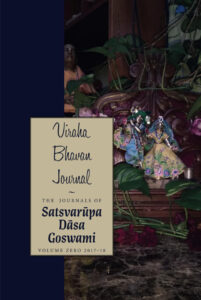
Viraha Bhavan Journal (2017–2018) was written by Satsvarūpa Mahārāja following a brief hiatus in writing activity, and was originally intended to be volume 1 in a series of published journals. However, following its completion and publication, Mahārāja again stopped writing books, subsequently focusing only on what became his current online journal, which began in August of 2018.
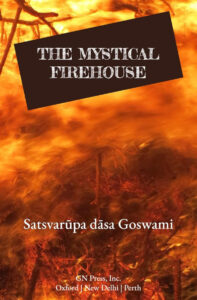
At first, I took it hard that I would have to live surrounded by the firemen, and without my own solitude. After all, for decades I had lived in my own house with my own books and my own friends. I was also now a crippled person who couldn’t walk, living among men who did active duties. But when Baladeva explained it to me, how it was not so bad living continually with other firemen and living in the firehouse with its limited facilities, I came to partially accept it and to accept the other men. I came to accept my new situation. I would live continually in the firehouse and mostly not go outside. I would not lead such a solitary life but associate with the other firemen.
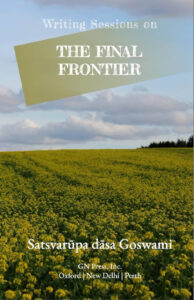
Let me write sweet prose.
Let me write not for my own benefit
but for the pleasure of Their Lordships.
Let me please Kṛṣṇa,
that’s my only wish.
May Kṛṣṇa be pleased with me,
that’s my only hope and desire.
May Kṛṣṇa give me His blessings:
Kṛṣṇa Kṛṣṇa Kṛṣṇa Kṛṣṇa Kṛṣṇa he
Rāma Rāghava Rāma Rāghava
Rāma Rāghava rakṣa mām.
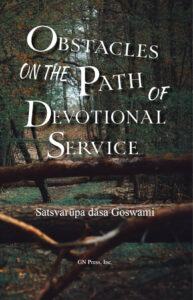
You mentioned that your pathway has become filled with stumbling blocks, but there are no stumbling blocks. I can kick out all those stumbling blocks immediately, provided you accept my guidance. With one stroke of my kick, I can kick out all stumbling blocks. —Letter by Śrīla Prabhupāda, December 9, 1972.
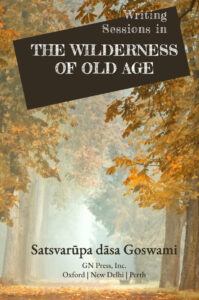
The Writing Sessions are my heart and soul. I’m trying my best to keep up with them. I am working with a few devotees, and they are far ahead of me. I wander in the wilderness of old age. I make my Writing Sessions as best I can. Every day I try to come up with a new subject. Today I am thinking of my parents. But I don’t think of them deeply. They are long gone from my life. Śrīla Prabhupāda wrote a poem when he was a sannyāsī, and he said now all my friends and relatives are gone. They are just a list of names now. I am like that too. I am a sannyāsī with a few friends. I love the books of Śrīla Prabhupāda. I try to keep up with them. I read as much as I can and then listen to his bhajanas.
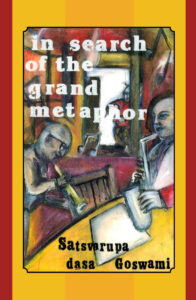
The metaphor is song. Explain it. Yes, particulars may not seem interesting or profound to readers who want structured books.
Wait a minute. Don’t pander to readers or concepts of Art. But Kṛṣṇa conscious criteria are important and must be followed. So, if your little splayed-out life-thoughts are all Kṛṣṇa conscious, then it’s no problem.
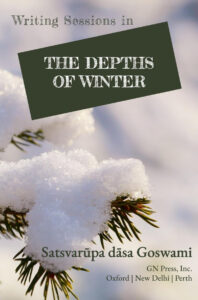
I am near the end of my days. But I do like the company of like-minded souls, especially those who are Kṛṣṇa conscious. Yes! I am prone to Kṛṣṇa consciousness. I have been a disciple of Bhaktivedanta Swami Prabhupāda for maybe almost sixty years. Sometimes I fail him. But I always bounce back and fall at his feet. It is a terrible thing that I sometimes do not have the highest love for him. It is a terrible thing. Actually, however, I never fall away from him. He always comes and catches me and brings me back to his loving arms.

This edition of Satsvarūpa dāsa Goswami’s 1996 timed book, Upstate: Room to Write, is published as part of a legacy project to restore Satsvarūpa Mahārāja’s writings to ‘in print’ status and make them globally available for current and future readers.
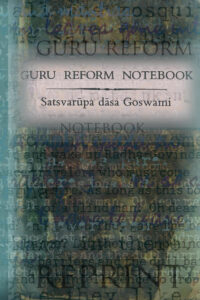
A factual record of the reform and change in ISKCON guru system of mid ’80s.

Readers will find, in the Appendix of this book, scans of a cover letter written by Satsvarūpa Mahārāja to the GN Press typist at the time, along with some of the original handwritten pages of June Bug. Together, these help to illustrate the process used by Mahārāja when writing his books during this period. These were timed books, in the sense that a distinct time period was allotted for the writing, during SDG’s travels as a visiting sannyāsī
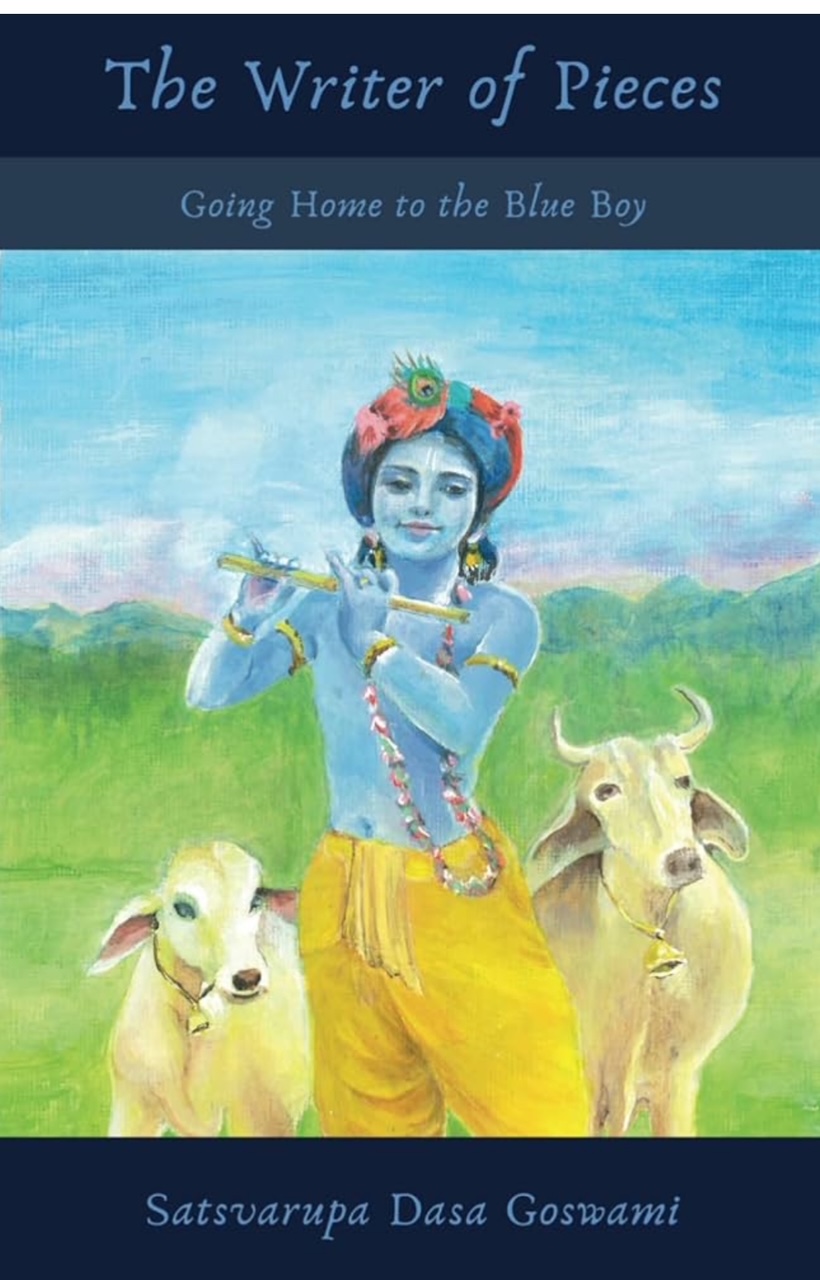
Don’t take my pieces away from me. I need them dearly. My pieces are my prayers to Kṛṣṇa. He wants me to have them, this is my way to love Him. Never take my pieces away.
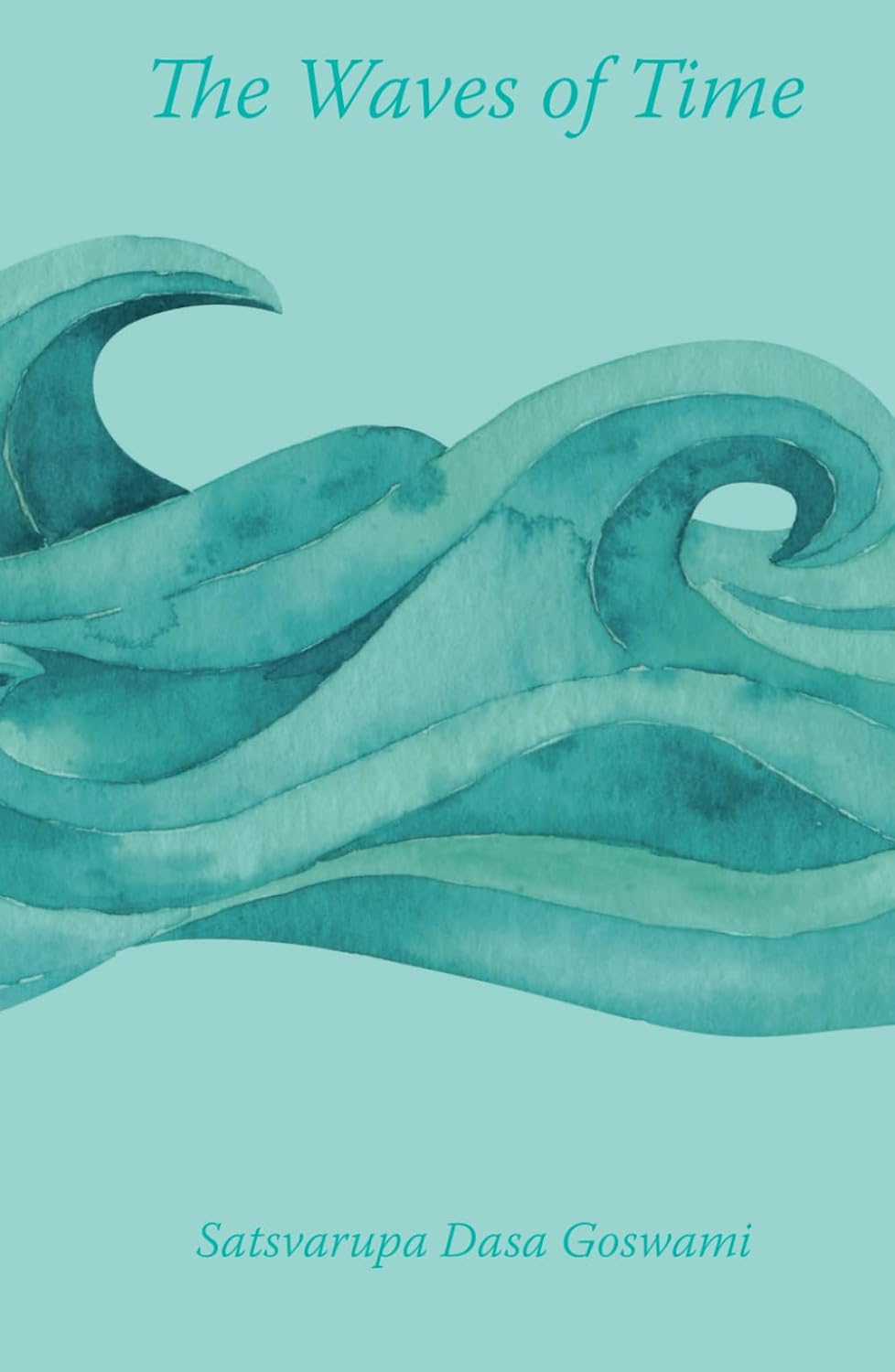
Many planks and sticks, unable to stay together, are carried away by the force of a river’s waves. Similarly, although we are intimately related with friends and family members, we are unable to stay together because of our varied past deeds and the waves of time.

To Śrīla Prabhupāda, who encouraged his devotees (including me) To write articles and books about Kṛṣṇa Consciousness.
I wrote him personally and asked if it was alright for his disciples to write books, Since he, our spiritual master, was already doing that. He wrote back and said that it was certainly alright For us to produce books.

I have a personal story to tell. It is a about a time (January–July 1974) I spent as a personal servant and secretary of my spiritual master, His Divine Grace A.C. Bhaktivedanta Swami Prabhupäda, founder-äcärya of the International Society for Krishna Consciousness. Although I have written extensively about Çréla Prabhupäda, I’ve hesitated to give this account, for fear it would expose me as a poor disciple. But now I’m going ahead, confident that the truth will purify both my readers and myself.

First published by The Gītā-nāgarī Press/GN Press in serialized form in the magazine Among Friends between 1996 and 2001, Best Use of a Bad Bargain is collected here for the first time in this new edition. This volume also contains essays written by Satsvarūpa dāsa Goswami for the occasional periodical, Hope This Meets You in Good Health, between 1994 and 2002, published by the ISKCON Health and Welfare Ministry.

This book has two purposes: to arouse our transcendental feelings of separation from a great personality, Śrīla Prabhupāda, and to encourage all sincere seekers of the Absolute Truth to go forward like an army under the banner of His Divine Grace A.C. Bhaktivedanta Swami Prabhupāda and the Kṛṣṇa consciousness movement.

A single volume collection of the Nimai novels.

Śrīla Prabhupāda was in the disciplic succession from the Brahmā-Mādhva-Gauḍīya sampradāya, the Vaiṣṇavas who advocate pure devotion to God and who understand Kṛṣṇa as the Supreme Personality of Godhead. He always described himself as simply a messenger who carried the paramparā teachings of his spiritual master and Lord Kṛṣṇa.

Dear Srila Prabhupada,
Please accept this or it’s worse than useless.
You have given me spiritual life
and so my time is yours.
You want me to be happy in Krishna consciousness
You want me to spread Krishna consciousness,

This collection of Satsvarūpa dāsa Goswami’s writings is comprised of essays that were originally published in Back to Godhead magazine between 1966 and 1978, and compiled in 1979 by Gita Nagari Press as the volume A Handbook for Kṛṣṇa Consciousness.

This second volume of Satsvarūpa dāsa Goswami’s Back to Godhead essays encompasses the last 11 years of his 20-year tenure as Editor-in-Chief of Back to Godhead magazine. The essays in this book consist mostly of SDG’s ‘Notes from the Editor’ column, which was typically featured towards the end of each issue starting in 1978 and running until Mahārāja retired from his duties as editor in 1989.

This collection of Satsvarupa dasa Goswami’s writings is comprised of essays that were originally published in Back to Godhead magazine between 1991 and 2002, picking up where Volume 2 leaves off. The volume is supplemented by essays about devotional service from issues of Satsvarupa dasa Goswami’s magazine, Among Friends, published in the 1990s.

“This is a different kind of book, written in my old age, observing Kṛṣṇa consciousness and assessing myself. I believe it fits under the category of ‘Literature in pursuance of the Vedic version.’ It is autobiography, from a Western-raised man, who has been transformed into a devotee of Kṛṣṇa by Śrīla Prabhupāda.”
 The Best I Could Do
The Best I Could DoI want to study this evolution of my art, my writing. I want to see what changed from the book In Search of the Grand Metaphor to the next book, The Last Days of the Year.
 a Hare Krishna Man
a Hare Krishna ManIt’s world enlightenment day
And devotees are giving out books
By milk of kindness, read one page
And your life can become perfect.
 Calling Out to Srila Prabhupada: Poems and Prayers
Calling Out to Srila Prabhupada: Poems and PrayersO Prabhupāda, whose purports are wonderfully clear, having been gathered from what was taught by the previous ācāryas and made all new; O Prabhupāda, who is always sober to expose the material illusion and blissful in knowledge of Kṛṣṇa, may we carefully read your Bhaktivedanta purports.

I use free-writing in my devotional service as part of my sādhana. It is a way for me to enter those realms of myself where only honesty matters; free-writing enables me to reach deeper levels of realization by my repeated attempt to “tell the truth quickly.” Free-writing takes me past polished prose. It takes me past literary effect. It takes me past the need to present something and allows me to just get down and say it. From the viewpoint of a writer, this dropping of all pretense is desirable.
 Geaglum Free Write
Geaglum Free WriteThis edition of Satsvarūpa dāsa Goswami’s 1996 timed book, Geaglum Free Write Diary, is published as part of a legacy project to restore Satsvarūpa Mahārāja’s writings to ‘in print’ status and make them globally available for current and future readers.